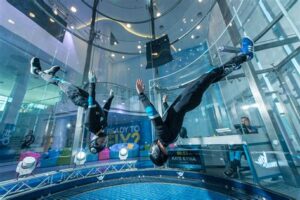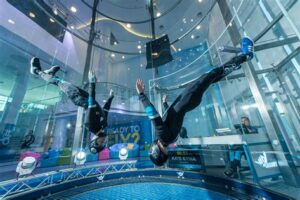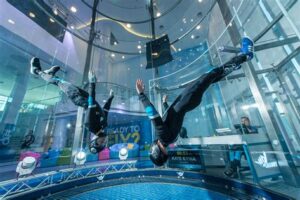Table of Contents
Discover effective techniques and remedies to unpop your ears after skydiving. This comprehensive guide provides step-by-step instructions and expert advice on relieving ear pressure and discomfort. Say goodbye to that muffled sensation and enjoy your post-skydiving experience to the fullest.
Have you recently experienced the exhilarating adventure of skydiving, only to find yourself struggling with the discomfort of popped ears? Fear not, for we have gathered a comprehensive guide on how to effectively unpop your ears after this adrenaline-pumping experience. Whether you are a seasoned skydiver or a first-timer, this article will provide you with useful tips and techniques to restore comfort and clarity to your auditory senses. So, let’s delve into the world of ear care and discover the secrets to relieving that unpleasant pressure in your ears!
Skydiving and Ear Discomfort: A Common Issue
Experiencing the thrill of skydiving is an unforgettable adventure for many adrenaline seekers. However, along with the exhilaration comes a potential side effect – ear discomfort. The rapid changes in air pressure during freefall and parachute descent can cause your ears to feel popped or blocked. Fortunately, there are several proven techniques to alleviate this discomfort and restore normal hearing. In this article, we will explore how to unpop your ears after skydiving.
Understanding Ear Popping
Before delving into solutions, it’s crucial to understand why your ears pop during skydiving. The Eustachian tube, a narrow passage connecting your middle ear to the back of your throat, plays a vital role in equalizing air pressure. When the pressure outside your ear differs significantly from the pressure inside, the Eustachian tube opens momentarily, allowing air to flow in or out. This equalization process helps maintain proper ear function and prevents discomfort.
Technique 1: Swallowing and Yawning
The simplest technique to unpop your ears after skydiving is swallowing or yawning. These actions activate the muscles responsible for opening the Eustachian tube, allowing air to flow and equalize the pressure. By swallowing or yawning intentionally, you can help relieve the discomfort and restore your hearing. Sucking on a piece of candy or chewing gum can also prompt these muscle movements.
Technique 2: The Valsalva Maneuver
If swallowing or yawning doesn’t resolve the ear popping, you can try the Valsalva maneuver. This technique involves closing your mouth, pinching your nose, and gently exhaling while keeping it closed. The maneuver helps push air through the Eustachian tube, equalizing the pressure. It is essential to perform this maneuver gently to avoid any damage to your ears.
Technique 3: Toynbee Maneuver
Another option to unpop your ears is the Toynbee maneuver. In this technique, you simultaneously swallow while pinching your nose, just like in the Valsalva maneuver. However, instead of exhaling, you swallow while keeping your mouth closed. This maneuver helps adjust the pressure in your ears and can assist in relieving the discomfort.
Technique 4: The Frenzel Maneuver
The Frenzel maneuver is a more advanced technique that requires practice but can be effective in unpoping your ears. It involves closing your mouth, keeping your nose unblocked, and making a k sound while swallowing or attempting to swallow. This maneuver helps control the muscles in the throat responsible for equalizing the pressure in your ears.
Technique 5: Nasal Spray or Decongestants
If the above techniques do not provide relief, you may opt for nasal sprays or decongestants. These medications help reduce swelling and congestion in the nasal passages, allowing the Eustachian tube to function more effectively. However, it is important to consult a healthcare professional before using any medication, as they can provide guidance based on your specific situation.
Technique 6: Wait It Out
Patience can also be a valuable approach when dealing with ear discomfort after skydiving. In some cases, your ears may naturally readjust over time. By avoiding additional pressure changes, such as flying or scuba diving, and giving your body time to recover, you may find that the discomfort subsides on its own.
When to Seek Medical Attention
In most cases, ear discomfort after skydiving is temporary and can be resolved using the techniques mentioned above. However, if you experience severe or prolonged pain, bleeding, dizziness, or any other concerning symptoms, it is important to seek medical attention immediately. A healthcare professional can assess your condition and provide appropriate guidance.
Conclusion
Skydiving can be an incredible adventure, but it can also lead to ear discomfort due to rapid changes in air pressure. By understanding the causes of ear popping and utilizing various techniques like swallowing, the Valsalva maneuver, Toynbee maneuver, Frenzel maneuver, nasal sprays, and decongestants, you can effectively unpop your ears and restore normal hearing. Remember to consult a healthcare professional if you are experiencing severe or prolonged symptoms. Enjoy your skydiving experience while keeping your ears comfortable and happy!
How To Unpop Ears After Skydiving
Skydiving can be an exhilarating experience, but it can also leave you with a discomforting sensation in your ears known as ear popping. This occurs due to the rapid changes in altitude and the unequal pressure in the middle ear. Understanding this sensation is the first step in effectively addressing and unpop your ears after skydiving.
1. Understanding the Ear Popping Sensation
The discomfort you feel when your ears pop during skydiving is a result of the Eustachian tubes failing to equalize the air pressure inside and outside your ears. These tubes are responsible for maintaining equilibrium, and when they don’t function properly, you may experience blocked or popped ears. By understanding this phenomenon, you can explore various techniques to alleviate the discomfort.
2. Yawning and Swallowing Techniques
One of the most effective ways to equalize the pressure in your ears is by yawning or swallowing. These actions prompt the Eustachian tubes to open momentarily, allowing air to flow and equalize the pressure. Practice yawning or swallowing regularly during or after your skydiving experience to help unpop your ears.
3. Nose-Pinching and Gently Blowing
Another technique that can help relieve ear popping is the nose-pinching and blowing method. Simply pinch your nose closed, close your mouth, and gently exhale through your nose. This action assists in equalizing the pressure in your ears. Be sure to blow gently to avoid causing additional discomfort or damage.
4. Chewing Gum or Sucking on Candy
Chewing gum or sucking on candy can aid in the normalization of air pressure in your ears. The continuous movement of your jaw while chewing or sucking helps activate the muscles responsible for opening the Eustachian tubes. This movement allows air to flow and gradually unpop your ears.
5. The Valsalva Maneuver
The Valsalva maneuver involves closing your mouth and pinching your nose while attempting to blow air out. This technique helps forcefully open the Eustachian tubes and equalize the pressure in your ears. However, it is important to use caution and not blow too forcefully to avoid potential damage to your ears.
6. Steam Inhalation
Inhaling steam can open up congested Eustachian tubes, relieving the discomfort caused by ear popping. After skydiving, fill a bowl with hot water, place a towel over your head, and breathe in the steam for several minutes. Gradually, the moist air will help unpop your ears and alleviate any pressure.
7. Nasal Decongestants
If your ears remain blocked and uncomfortable after attempting the techniques mentioned above, you may consider using over-the-counter nasal decongestants. These medications can help reduce congestion in your nasal passages and allow the Eustachian tubes to open and equalize the pressure more easily.
8. Seeking Medical Attention
If none of the above methods prove effective or if you experience prolonged discomfort, it is advisable to seek medical attention. An ENT specialist can evaluate your condition and recommend appropriate measures or treatments to address persistent ear popping after skydiving.
Remember, while skydiving may be an exhilarating experience, taking care of your ears’ health and well-being is equally important. By following these techniques and seeking medical assistance if needed, you can ensure a comfortable and enjoyable skydiving adventure.
In order to safely and effectively unpop ears after skydiving, it is important to follow a few simple steps. By taking the necessary precautions, individuals can alleviate discomfort and prevent potential complications. Here is a professional guide on how to unpop ears after skydiving:
1. Stay calm and patient:
- It is crucial to remain calm and composed when dealing with ear pressure issues after skydiving.
- Panic or sudden movements can worsen the situation, leading to further discomfort.
2. Yawn or swallow:
- Engaging in yawning or swallowing can help equalize the pressure in the ears.
- These actions activate the muscles responsible for opening the Eustachian tubes, allowing air to flow and release pressure.
3. Perform the Valsalva maneuver:
- The Valsalva maneuver involves closing your mouth, pinching your nose, and gently blowing out to force air into the Eustachian tubes.
- Be cautious not to blow too forcefully, as this can cause damage to the delicate structures of the ears.
4. Chew gum or suck on candy:
- Munching on gum or sucking on candy encourages swallowing, which aids in equalizing ear pressure.
- Opt for sugar-free options to avoid potential dental issues or unwanted calories.
5. Use the Toynbee maneuver:
- The Toynbee maneuver involves pinching your nose and swallowing simultaneously.
- This maneuver stimulates the muscles responsible for opening the Eustachian tubes and can help equalize pressure.
6. Avoid excessive nose blowing:
- Blowing your nose forcefully can exacerbate ear pressure issues.
- If needed, blow your nose gently and one nostril at a time to minimize the risk of worsening the situation.
7. Consider decongestants:
- If you are experiencing persistent ear pressure after skydiving, over-the-counter decongestants may help.
- Consult with a healthcare professional or pharmacist to ensure the appropriate product and dosage for your situation.
8. Seek medical attention if necessary:
- If discomfort persists or if you experience severe pain, dizziness, or hearing loss, it is crucial to seek medical attention promptly.
- A healthcare professional will be able to assess your condition and provide appropriate treatment if needed.
By following these guidelines, individuals can effectively alleviate ear pressure and unpop their ears after skydiving. It is essential to prioritize safety and take the necessary steps to maintain ear health throughout the process.
Thank you for taking the time to read our article on how to unpop ears after skydiving. We hope that you have found the information provided helpful and informative. Skydiving can be an exhilarating experience, but it can also lead to discomfort and pressure in the ears. In this article, we have discussed various methods and techniques that can be used to relieve this discomfort and restore normal hearing.
First and foremost, it is important to understand why our ears pop during skydiving. The rapid changes in altitude and air pressure can cause a blockage in the Eustachian tubes, which are responsible for equalizing pressure in the ears. When these tubes become blocked, it can result in muffled hearing and discomfort. However, there are several techniques that can be used to alleviate this issue.
One of the most effective methods for un-popping the ears after skydiving is the Valsalva maneuver. This technique involves closing your mouth, pinching your nose, and gently blowing out as if you were trying to inflate a balloon. This action helps to open up the Eustachian tubes and equalize the pressure in the ears. It is important to remember to blow gently and not forcefully, as excessive pressure can cause damage to the ears.
Another technique that can be used to unpop the ears is the Toynbee maneuver. This method involves swallowing while pinching your nose. Swallowing helps to open up the Eustachian tubes, while pinching your nose prevents air from escaping. This combination can help to equalize the pressure in the ears and relieve discomfort.
In conclusion, experiencing discomfort and pressure in the ears after skydiving is a common occurrence due to rapid changes in altitude and air pressure. However, by implementing the techniques discussed in this article, such as the Valsalva maneuver and the Toynbee maneuver, you can effectively unpop your ears and restore normal hearing. We hope that this article has provided you with valuable information and solutions to alleviate any discomfort you may experience in the future. Safe travels and happy skydiving!
Video How To Unpop Ears After Skydiving
Here are some common questions that people also ask about how to unpop their ears after skydiving:
-
Why do my ears pop after skydiving?
-
How long does it take for ears to unpop after skydiving?
-
What can I do to unpop my ears after skydiving?
- Swallowing: Swallowing helps to activate the muscles that open the Eustachian tube, which connects the middle ear to the back of the throat. This can help equalize the pressure and relieve the popping sensation.
- Yawning: Yawning has a similar effect to swallowing and can help open the Eustachian tube, allowing the pressure in the middle ear to equalize.
- Valsalva maneuver: Pinch your nostrils shut, close your mouth, and gently exhale while keeping your lips closed. This maneuver can help equalize the pressure in your ears.
- Toynbee maneuver: Pinch your nostrils shut and swallow at the same time. This technique combines both swallowing and the closing of the nasal passage, which can aid in equalizing the ear pressure.
-
Are there any home remedies to unpop ears after skydiving?
- Chewing gum or sucking on candy: The constant chewing or sucking motion encourages swallowing, helping to open the Eustachian tube and relieve ear pressure.
- Applying warmth: Placing a warm compress or warm towel against your ears can promote blood flow and relaxation of the Eustachian tubes, aiding in equalizing the pressure.
- Using a decongestant nasal spray: If you suspect congestion or sinus issues are contributing to the ear popping, using a decongestant nasal spray may help alleviate symptoms.
Ears can pop after skydiving due to the rapid changes in air pressure experienced during the descent. As you descend from a high altitude to ground level, the air pressure around you increases, causing a difference in pressure between your middle ear and the outside environment. This pressure differential can lead to a sensation of plugged or popped ears.
The time it takes for your ears to unpop can vary depending on the individual and the severity of the pressure imbalance. In most cases, the ears will naturally equalize within a few minutes to an hour after landing. However, if you continue to experience discomfort or muffled hearing for an extended period, it is advisable to seek medical attention.
If you are looking to unpop your ears after skydiving, here are a few techniques you can try:
While the techniques mentioned earlier can be considered home remedies, there are a few additional methods you can try:
If your ears do not unpop or if you experience severe pain, discomfort, or changes in hearing after skydiving, it is essential to consult a healthcare professional for further evaluation and guidance.






